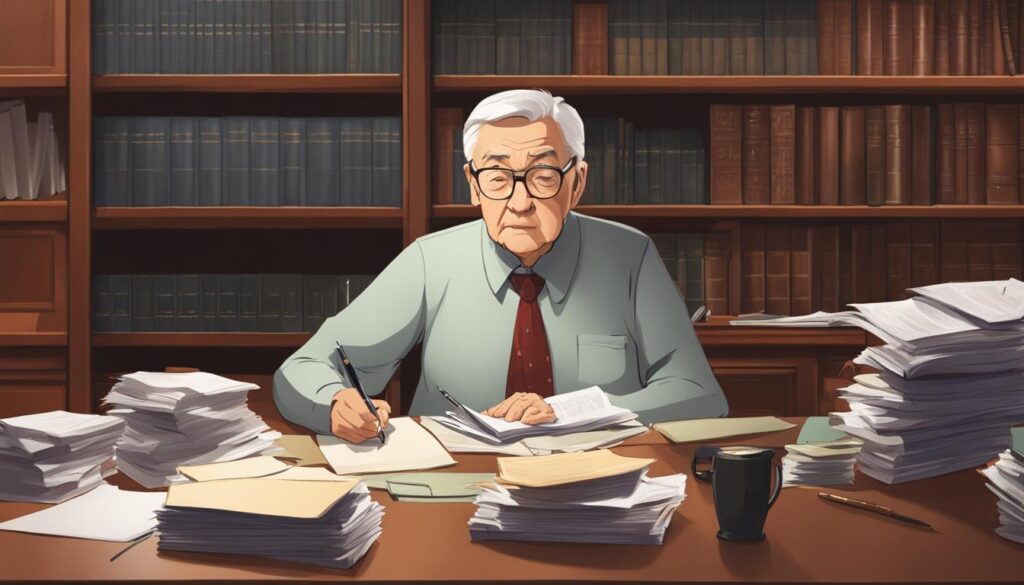As we enter our 70s, it becomes increasingly important to plan for the future and ensure that our legal affairs and documentation are in order. From estate planning to future healthcare considerations, there are crucial steps to take to protect our interests and ensure that our wishes are honored. In this article, we will explore the various aspects of managing legal affairs at 70, including legal documents, powers of attorney, and seeking professional legal advice.
Key Takeaways:
- Planning for the future is essential for emergencies and end-of-life situations.
- Estate and financial planning involves legal documents such as wills and powers of attorney.
- Future healthcare planning includes advance directives and naming a health care proxy.
- Organizing important papers is crucial for easy access and security.
- Consulting with an elder law attorney can provide guidance and ensure legal protection.
Estate and Financial Planning
When it comes to managing your legal affairs in your 70s, estate and financial planning are essential components. By creating the necessary legal documents, you can ensure that your assets are distributed according to your wishes and that someone you trust can make financial decisions on your behalf if needed.
Estate Planning:
| Document | Description |
|---|---|
| Will | A will outlines how your estate will be distributed after your passing, including property, assets, and personal belongings. |
| Durable Power of Attorney for Finances | This document designates someone to make financial decisions on your behalf in case you become unable to manage them on your own. |
| Living Trust | A living trust appoints a trustee to hold and distribute your property and funds according to your instructions, potentially avoiding probate. |
Estate planning ensures that your assets are protected and distributed according to your wishes, providing peace of mind for you and your loved ones.
Financial Planning:
In addition to estate planning, financial planning is crucial for managing your finances effectively in your 70s. Consider working with a financial advisor to develop a comprehensive plan that covers investment strategies, retirement funds, insurance policies, and long-term care expenses. This plan will help you make informed financial decisions and secure your financial future.

By engaging in estate and financial planning, you can ensure that your legal affairs are in order and that your financial future is protected. These essential steps provide you with peace of mind and enable you to focus on enjoying your golden years.
Future Healthcare Planning
Planning for your future healthcare is an essential aspect of managing legal affairs in your 70s. By taking proactive steps, such as preparing advance directives and designating a power of attorney for health care, you can ensure that your healthcare wishes are respected and that someone you trust is empowered to make decisions on your behalf.
An advance directive is a legal document that allows you to outline your preferences for medical treatments in case you become unable to communicate your wishes. One common type of advance directive is a living will, which specifies the types of medical interventions you would like to receive or avoid in different situations. By creating a living will, you can provide clear guidance to your healthcare providers and loved ones, ensuring that your desired level of care is upheld.
In addition to a living will, it is also important to designate a power of attorney for health care. This person, also known as a health care proxy, will have the authority to make medical decisions on your behalf if you are unable to do so. It is crucial to choose someone you trust and discuss your wishes with them in advance. A power of attorney for health care ensures that your medical preferences are followed even if unforeseen circumstances arise.
| Advance Directives | Living Will | Power of Attorney for Health Care |
|---|---|---|
| Allows you to specify your medical treatment preferences | Outlines the types of medical interventions you would like to receive or avoid in different situations | Designates a proxy to make medical decisions on your behalf if you are unable to do so |
| Gives clear guidance to healthcare providers and loved ones | Ensures your desired level of care is upheld | Empowers someone you trust to make decisions according to your wishes |
Preparing advance directives, such as a living will and a power of attorney for health care, is an important part of future healthcare planning. These documents give you control over your medical treatment and provide peace of mind knowing that your preferences will be respected. It is recommended to discuss your wishes with your loved ones and medical professionals, ensuring that everyone is aware of your healthcare choices.
Organizing Important Papers
When it comes to managing your important papers, organization is key. Having all your documents in one place ensures that they are easily accessible when needed. There are several methods you can use to organize your important papers effectively.
One option is to set up a file system where you can categorize and store your documents. This can be done using file folders, labels, and a filing cabinet. Make sure to create categories that make sense for your needs, such as financial documents, legal documents, and medical records. Keeping your files organized and labeling them clearly will save you time and frustration when you need to find a specific document.
Another important consideration is the security of your important papers. Using a fireproof and waterproof safe can provide added protection for your documents. In the event of a fire or flood, a fireproof safe will keep your papers safe from damage. Be sure to choose a safe that is large enough to hold all your important documents and is easily accessible to you or your trusted loved ones.
It is also a good idea to keep copies of your important papers in a separate location. This can be with a trusted family member or friend, or in a safe deposit box at a bank. Having duplicates of your documents ensures that you have a backup in case the originals are lost or damaged. Be sure to inform someone you trust or your lawyer about the location of your important papers and any copies you have made.
| Benefits of Organizing Important Papers |
|---|
| Easy access to important documents |
| Time and frustration saved when searching for specific papers |
| Added protection through the use of a fireproof and waterproof safe |
| Security of important papers through duplicate copies |
By organizing your important papers and keeping them secure, you can have peace of mind knowing that your documents are easily accessible and protected. Take the time to create a system that works for you and regularly review and update your files as needed. This will ensure that you are prepared for any situation that may arise and can easily navigate your legal affairs in your 70s.

Seeking Legal Assistance
As you navigate the complexities of legal affairs in your 70s, it can be beneficial to consult with a lawyer who specializes in elder law. They have the expertise and knowledge to guide you through the various legal and financial issues that may arise during this stage of life. By seeking legal assistance, you can ensure that your wishes are legally protected and your future plans are properly executed.
A lawyer can assist you in setting up important legal documents such as wills, durable powers of attorney, and living trusts. These documents are essential for estate and financial planning, as they outline how your assets will be distributed and who will make decisions on your behalf in case you are unable to. With the help of a lawyer, you can ensure that these documents are properly drafted and legally enforceable.
In addition to estate and financial planning, a lawyer can also provide guidance on end-of-life planning. They can help you navigate the complexities of advance directives, such as living wills and durable powers of attorney for healthcare. These documents allow you to specify your treatment preferences and appoint a healthcare proxy to make medical decisions on your behalf. By seeking legal advice, you can ensure that your end-of-life wishes are honored and your loved ones are aware of your preferences.
Furthermore, an elder law lawyer can assist you in understanding the coverage for long-term care services and help you make informed decisions about healthcare and long-term care decision-making. They can provide valuable insights into managing personal care and property, and ensure that you have a comprehensive plan in place for your future care needs. By working with a lawyer, you can have peace of mind knowing that your legal affairs are in order and your future is secure.

In summary, seeking legal assistance is crucial for effectively managing your legal affairs in your 70s. A lawyer specializing in elder law can provide valuable advice and guidance, ensuring that your wishes are legally protected and your future plans are properly executed. From estate and financial planning to end-of-life decisions, a lawyer can be a valuable partner in navigating the complexities of legal affairs. By consulting with a lawyer, you can have peace of mind knowing that your legal affairs are in order and your future is secure.
Can Managing Legal Affairs also Include Setting up Advanced Healthcare Directives in Your 70s?
Managing legal affairs in your 70s can encompass setting up advanced healthcare directives. It’s crucial to plan for future medical decisions as you age. Advanced healthcare directives in 70s ensure your wishes are followed should you become unable to make decisions about your own healthcare.
Conclusion
Managing legal affairs and documentation in your 70s is crucial for ensuring that your wishes are honored and your future is secure. By planning for estate and finances, future healthcare, organizing important papers, seeking legal assistance, and discussing your plans with loved ones and a doctor, you can navigate the complexities of legal affairs at 70 proficiently and have peace of mind.
Properly addressing legal affairs and documentation in your 70s allows you to make informed decisions that protect your assets and ensure your intentions are respected. Take the time to create essential legal documents such as wills, powers of attorney, and advance directives. These documents provide the framework for important decisions regarding your estate, finances, and healthcare.
Elder care is a multifaceted responsibility that requires meticulous attention to detail. Organizing important papers and storing copies of legal documents in a secure location is essential. Informing a trusted individual or lawyer about the location of these documents provides an added layer of protection and ensures they can be accessed when needed.
Seeking legal assistance from an experienced elder law attorney can provide invaluable guidance throughout the process. These professionals specialize in end-of-life planning, healthcare decision-making, property management, and long-term care services. By consulting with a lawyer, you can feel confident that your legal affairs are in order and your future is properly planned for.
FAQ
What steps should I take to plan for my legal affairs and documentation in my 70s?
Common steps to consider include planning for your estate and finances, preparing for future healthcare, organizing important papers, discussing advance care planning with loved ones and a doctor, giving permission for a doctor or lawyer to talk with your caregiver, and regularly reviewing your plans.
What is involved in estate and financial planning in your 70s?
Estate and financial planning in your 70s involves preparing different types of legal documents such as a will, durable power of attorney for finances, and a living trust.
What is the purpose of a will?
A will outlines how your estate will be distributed after your passing.
What is a durable power of attorney for finances?
A durable power of attorney for finances names someone to make financial decisions on your behalf.
What is a living trust?
A living trust names a trustee to hold and distribute property and funds on your behalf.
What is involved in future healthcare planning?
Future healthcare planning includes preparing advance directives such as a living will and a durable power of attorney for health care.
What is a living will?
A living will specifies your treatment preferences in case you cannot make your own decisions about your healthcare.
What is a durable power of attorney for health care?
A durable power of attorney for health care names a health care proxy to make healthcare decisions for you if you are unable to do so.
How can I organize my important papers and legal documents?
You can set up a file, use a fireproof and waterproof safe, or list the information in a notebook. It is crucial to inform someone you trust or a lawyer about the location of your important papers.
How can I seek legal assistance in managing my affairs in my 70s?
Consulting with a lawyer who specializes in elder law can be helpful when it comes to managing legal affairs in your 70s. They can assist with setting up legal documents and provide guidance on various legal and financial issues.

